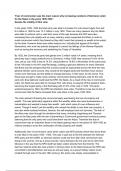‘Fear of communism was the main reason why increasing numbers of Germans voted
for the Nazis in the years 1930-1932.’
Assess the validity of this view.
In the years 1930 -1932 the Nazi party was able to increase it's vote share hugely from just
6.4 million in 1930 to over 13.7 million in July 1932. There are many reasons why the Nazis
were able to achieve such a vast feat; some of this was because the KPD were also
increasing their vote rapidly and so many ordinary voters supported the NAzis in order to
avoid communism which they feared as they didn’t want their property or wealth to be seized
by the state. However there were other reasons too, including the appeal of the Nazis
themselves, who now had policies designed to correct the failings of the Weimar Republic
such as saving the economy and abolishing the Treaty of Versailles.
By 1932, the Communist party had gained over 2 million votes in 4 years, meaning that it
genuinely was a major political force in Germany. In May 1928, they received 10.8% of the
vote, yet by July 1932 it was at 14.3%, rising further to 16.9% in November of the same year.
It had 100 seats in the 491 seat Reichstag, creating a genuine dilemma for many Germans
that there was the prospect that this success would be exponential and by the time the next
general election came around, they would be the largest party and therefore have serious
control over Germany and the ability to change Germany, in their eyes, for the worse. This
threat was enough to make many ordinary communism-fearing Germans vote for the only
party who they believed could beat the KPD: the Nazis. As a result of the rise in Communist
votes, the Nazis too were able to increase their vote share, by playing off the people’s fears -
becoming the largest party in the Reichstag with 37.3% of the vote in 1932. This tactic
worked because by 1933, the KPD had started to lose votes. Therefore it was due to fear of
communism that the Nazis increased their vote share in the years 1930-1932.
The main element of fearing the communist party was fearing the loss of property and
wealth. This was particularly apparent within the wealthy elites who were businessmen or
industrialists and wanted to keep their wealth - with which came it's own influence and
power. Though it wasn’t just the wealthy who valued the ability to own their own property, it
was also white-coolared workers, farmers, the self-employed and civil servants. The fear of
the elites was clear through the donations that many, including Hugenberg and Thyssen,
gave to the Nazi party with the aim of preventing a Communist government coming to power,
believing that the only party who could beat them was the Nazis. Therefore the fear of
communism was an important factor in the Nazis gaining votes in the period of 1930-1932 as
millions wanted to avoid the confiscation of their property and wealth.
Additionally, fear of communism came when voters saw KPD policies which then drove them
to vote Nazi in the years 1930 - 1932. This was in part due to the link between the German
KPD party and the USSR, so German citizens could see from afar what communism was
doing to the country. And as a proud country, many Germans did not want to be ruled from
Moscow in the way that the KPD itself had taken orders directly from the Kremlin. The
German national pride also was a factor in driving voters to the Nazis because the KPD was
committed to demilitarisation and was an anti-war party, as a proud military nation (even
created through wars in the late 19th century), this policy was simply unacceptable to





